Enhanced TDS
Identification & Functionality
- Chemical Family
- Fillers Included
- RTU Product Type
- Technologies
- Product Families
Features & Benefits
- Ready-to-Use Product Features
- Features and Benefits
- Good resistance to mechanical and electrical stresses.
- Good resistance to thermal shock.
- High glass transition temperature
Applications & Uses
- Composites Processing Methods
- Product End Uses
- Markets
- Applications
- Processing Information
The effective pot-life is about 2 days at temperature below 25°C. Conventional batch mixers should be cleaned once a week or at the end of work. For longer interruptions of work, the pipes of the mixing and metering installations have to be cooled and cleaned to prevent sedimentation and/or undesired viscosity increase. Interruptions over a weekend (approx. 48h) without cleaning are possible if the pipes are cooled at temperature below 18°C. Viscosity increase and gel time at various temperatures, refer to Figs: 1, 2 and 3.
Mold temperature
APG process 130 - 160 °C
Demolding times (depending on mould temperature and casting volume) APG process 15 - 40 min
Cure conditions
APG process (suggest postcure) 10h at 130 °C
To determine whether crosslinking has been carried to completion and the final proper-ties are optimal, it is necessary to carry out relevant measurements on the actual object or to measure the glass transition temperature. Different gel and postcuring cycles in the manufacturing process could influence the crosslinking and the glass transition temperature respectively.Processing Viscosities
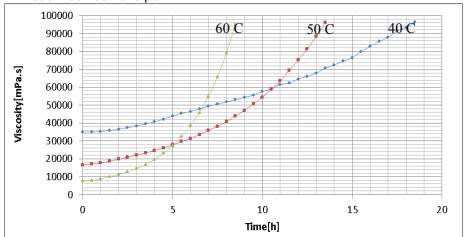
Fig.1:Viscosity increase at 40, 50 and 60 °C (measurements with Brookfield)
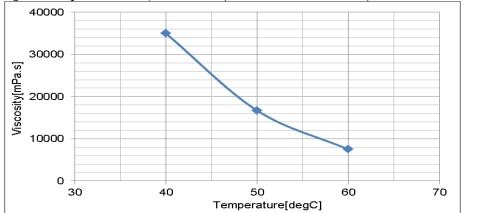
Fig.2: Initial mixed viscosity as a function of temperature (measured with a Brookfield viscometer)
Gelation/Cure Times
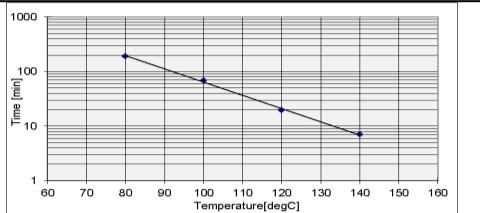
Fig.3: Geltime measured in function of temperature (measurement with Gelnorm Instrument) Note : Silica grades and quality can influence the processing data such as initial mixed viscosity,etc.
Mechanical and Physical Properties
Property Test Method Unit Condition Tensile strength ISO 527-2:2012 MPa Cured for 6 hours at 80°C and 10 hours at 130°C, 70-90
E modulus from tensile test
MPa Cured for 6 hours at 80°C and 10 hours at 130°C, 10,000-13,000
Tensile strain % Cured for 6 hours at 80°C and 10 hours at 130°C, 1.30-1.70
Flexural strength ISO 178:2010 MPa Cured for 6 hours at 80°C and 10 hours at 130°C, 130-150
E modulus from flexural test
MPa Cured for 6 hours at 80°C and 10 hours at 130°C, 8,000-12,000
Flexural strain % Cured for 6 hours at 80°C and 10 hours at 130°C, 1.60-2.00
Impact strength ISO 179-1:2010 KJ/m² Cured for 6 hours at 80°C and 10 hours at 130°C, 10-16
Double Torsion Test PM 216/08 N/A Cured for 6 hours at 80°C and 10 hours at 130°C
Critical stress intensity factor (KIC)
MPa·m¹/² Cured for 6 hours at 80°C and 10 hours at 130°C, 3.1-3.5
Specific energy at break (GIC)
J/m² Cured for 6 hours at 80°C and 10 hours at 130°C, 850-1,100
Glass transition temperature (DSC) ISO 11357-2:1999 °C Cured for 6 hours at 80°C and 10 hours at 130°C, 105-120
Coefficient of linear thermal expansion ISO 11359:1999 ppm/K Cured for 6 hours at 80°C and 10 hours at 130°C, Mean value below Tg: 37-45
Electrical Properties
Breakdown strength at 50 Hz (RT) IEC 60243-1 kV/mm Cured for 6 hours at 80°C and 10 hours at 130°C, 25-30
HV arc resistance ASTM D 495 s Cured for 6 hours at 80°C and 10 hours at 130°C, 183-187
Tracking resistance IEC 60112 N/A Cured for 6 hours at 80°C and 10 hours at 130°C, With test solution A: CTI >600-<1.0, With test solution B: CTI >600M-<1.0
Electrolytic corrosion effect IEC 60426 Grade Cured for 6 hours at 80°C and 10 hours at 130°C, A-1
Dielectric constant at 50 Hz (RT) IEC 60250 Cured for 6 hours at 80°C and 10 hours at 130°C, 4.2
Dielectric loss factor at 50 Hz (RT) IEC 60250 % Cured for 6 hours at 80°C and 10 hours at 130°C, 2.7
Electrical Properties
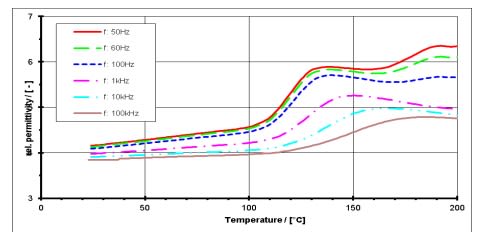
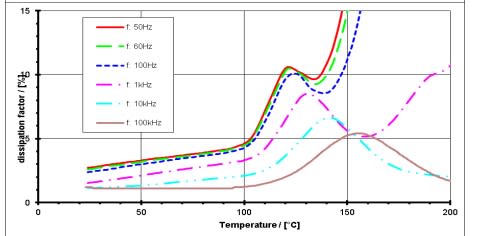
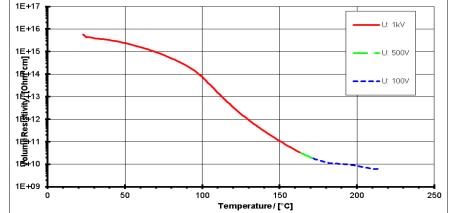
- System Preparation
General instructions for preparing liquid resin systems.
- Long pot life is desirable in the processing of any casting resin system. Mix all of the components together very thoroughly at room temperature or slightly above and under vacuum. Intensive wetting of the filler is extremely important. Proper mixing will result in:
- Better flow properties and reduced tendency to shrinkage
- Lower internal stresses and therefore improved mechanical properties on object
- Improved partial discharge behaviour in high voltage applications.
- For the mixing of medium to high viscous casting resin systems and for mixing at lower temperatures, we recommend special thin film degassing mixers that may produce additional self-heating of 10-15 K as a result of friction. For low viscous casting resin systems, conventional anchor mixers are usually sufficient.
- In larger plants, two pre-mixers are used to mix the individual components with the respective quantities of fillers and additives under vacuum. Metering pumps then feed these premixes to the final mixer or a continuous mixer. The individual premixes can be stored at elevated temperature (about 60°C) for up to about 1 week, de-pending on formulation. Intermittent agitation during storage is advisable to prevent filler sedimentation.
- Mixing time can vary from 0.5 to 3 hours, depending on mixing temperature, quantity, mixing equipment and the particular application. The required vacuum is 0.5 to 5 mbar. Degassing time is recommended at least 1 hour. The vapour pressure of the individual components should be taken into account.
- In the case of dielectrically highly stressed parts, we recommend checking the quality consistency and pre-drying of the filler. Their moisture content should be <0.2%.
- Application Information
The manufacture of electrical insulating components for medium and high voltage indoor equipment, e.g. embedded pole, post type insulators, breaker and switchgear parts, bushings, and mechanically stressed parts
- Mixing Ratio
Component Parts by weight Araldite® CY 5910 US Resin 100 Aradur® HY 1102 Hardener 89 Accelerator DY 062 0.3 Araldite® DW 9134 BD Resin 5 Silica (silanized) 310
Properties
- Physical Form
Technical Details & Test Data
- Technical Data
Filler
The addition of powdered mineral filler such as silica flour, Microdol, chalk flour, etc. has been found to improve the performance of castings in a large number of applications. In particular, the use of mineral fillers:
- Reduces shrinkage and decreases exothermic temperature rise on curing.
- Imparts a lower coefficient of thermal expansion.
- Improves thermal conductivity.
- Imparts a higher elastic modulus but reduces elongation at break.
- Cuts the production cost per casting.
The performance data given below for filled system was all determined using standard test specimens containing mixed various fillers.
Storage & Handling
- Storage Conditions
The resin components have to be stored under dry conditions at 2-40°C, and the hardener components have to be stored under dry conditions at 2-40°C, in tightly sealed original containers. Under these conditions, the shelf life will correspond to the expiry date stated on the label. After this date, the product may be processed only following reanalysis. Partly emptied containers should be closed tightly immediately after use.
Other
- Application Information
Value Units Test Method / Conditions Mix Ratio 0.85 %(W) %(W) Hardener : Resin
